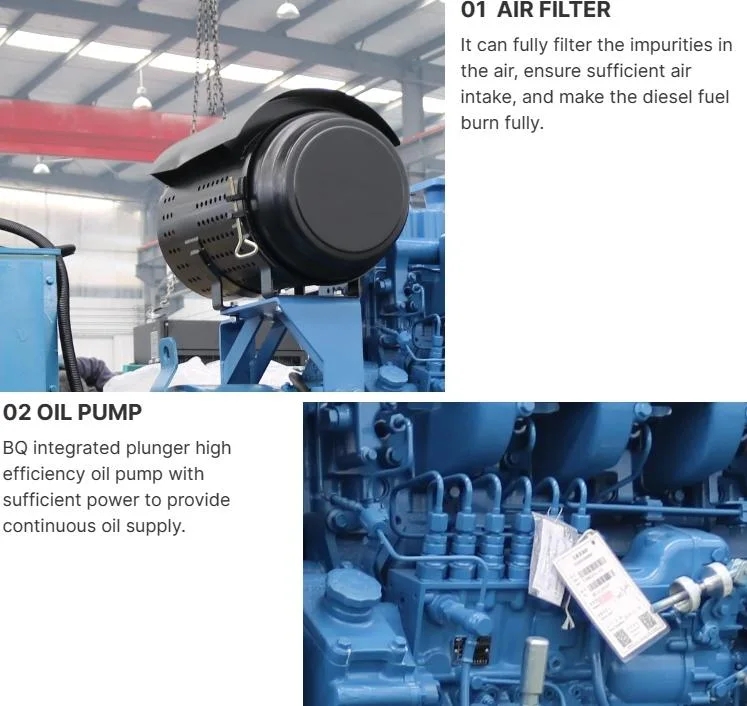Introduction
In today's fast-paced world, the demand for reliable and continuous power supply is more critical than ever. Businesses, industries, and even households rely heavily on electricity to carry out their day-to-day operations. However, power outages and fluctuations are common occurrences that can disrupt operations and lead to financial losses. This is where diesel generators come into play, offering a dependable backup power solution for load management.
What is a Diesel Generator?
A diesel generator is a type of power generation equipment that uses a diesel engine to convert mechanical energy into electrical energy. These generators are commonly used as backup power sources in areas where the grid power supply is unreliable or during emergencies such as natural disasters.
How Does a Diesel Generator Work?
Diesel generators operate on the principle of electromagnetic induction. When the diesel engine is activated, it drives a generator that produces electricity through the rotation of a magnetic field within a coil of wire. This electrical energy is then transmitted through the generator's output terminals to power electrical devices and equipment.
Benefits of Diesel Generators for Load Management
1. Reliability: Diesel generators are known for their reliability and durability, making them an ideal choice for load management. They can provide continuous power for extended periods, ensuring uninterrupted operations during power outages.
2. Fuel Efficiency: Diesel engines are more fuel-efficient compared to gasoline engines, making diesel generators a cost-effective option for long-term use. This efficiency results in lower fuel consumption and operating costs, especially for businesses with high power demands.

3. Easy Maintenance: Diesel generators require minimal maintenance and are designed to operate efficiently with regular servicing. This ease of maintenance ensures that the generator remains in optimal condition, ready to kick in when needed for load management.
4. Scalability: Diesel generators come in various sizes and power capacities, allowing users to choose the right generator based on their specific load requirements. This scalability makes diesel generators suitable for a wide range of applications, from small businesses to large industrial facilities.
5. Quick Start-Up: Diesel generators can start and provide power within seconds of a power outage, ensuring minimal downtime and seamless load management. This quick start-up time is crucial for critical operations that cannot afford interruptions in power supply.
Applications of Diesel Generators in Load Management
1. Commercial Buildings: Commercial buildings such as offices, malls, and hotels rely on diesel generators to maintain essential services during power outages. These generators ensure that elevators, security systems, lighting, and HVAC systems continue to operate smoothly, minimizing disruptions for tenants and customers.
2. Industrial Facilities: Industries with sensitive equipment and production processes depend on diesel generators to prevent costly downtime and production losses. These generators provide backup power for critical machinery, control systems, and lighting, ensuring uninterrupted operations during emergencies.
3. Hospitals and Healthcare Facilities: Hospitals and healthcare facilities require a reliable power supply to support life-saving equipment, patient care, and essential services. Diesel generators are essential for load management in these settings, ensuring that medical equipment, lighting, and climate control systems remain operational during power outages.
4. Data Centers: Data centers house mission-critical IT equipment that must operate 24/7 without interruptions. Portable diesel generator for outdoor education programs are used in data centers to provide backup power for servers, cooling systems, and security infrastructure, safeguarding data integrity and preventing downtime in the event of power failures.
5. Construction Sites: Construction projects often take place in remote locations or areas with unreliable power supply. Diesel generators are commonly used on construction sites to power tools, lighting, and temporary facilities, enabling construction crews to work efficiently and meet project deadlines.
Factors to Consider When Choosing a Diesel Generator for Load Management
1. Power Output: The power output of a diesel generator should match the total load requirements of the devices and equipment it will be powering. It is essential to calculate the peak power demands to ensure that the generator can handle the load effectively.
2. Fuel Efficiency: Consider the fuel efficiency of the diesel generator, as this will impact operating costs and long-term savings. Choose a generator with a high fuel efficiency rating to minimize fuel consumption and lower expenses over time.
3. Size and Portability: Select a diesel generator that is appropriately sized for the intended application and can be easily transported to different locations if needed. Portable diesel generators are convenient for mobile operations or temporary power needs.
4. Noise Levels: Diesel generators can be noisy during operation, which may be a concern in residential areas or noise-sensitive environments. Look for generators with soundproofing features or consider installing noise-reducing enclosures to minimize noise levels.
5. Maintenance Requirements: Evaluate the maintenance requirements of the diesel generator, including service intervals, replacement parts availability, and warranty coverage. Choose a generator with a reliable maintenance schedule and easy access to spare parts for efficient upkeep.
6. Compliance and Regulations: Ensure that the diesel generator complies with local regulations, emissions standards, and safety requirements. It is essential to adhere to legal guidelines to prevent fines and penalties and ensure the safe operation of the generator.
Conclusion
Diesel generators play a crucial role in load management by providing reliable backup power during emergencies and power outages. Their durability, fuel efficiency, and scalability make them an ideal choice for various applications, from commercial buildings to healthcare facilities. When choosing a diesel generator for load management, consider factors such as power output, fuel efficiency, size, noise levels, maintenance requirements, and compliance with regulations. By selecting the right diesel generator for your specific needs, you can ensure uninterrupted power supply and seamless operations in any situation.
